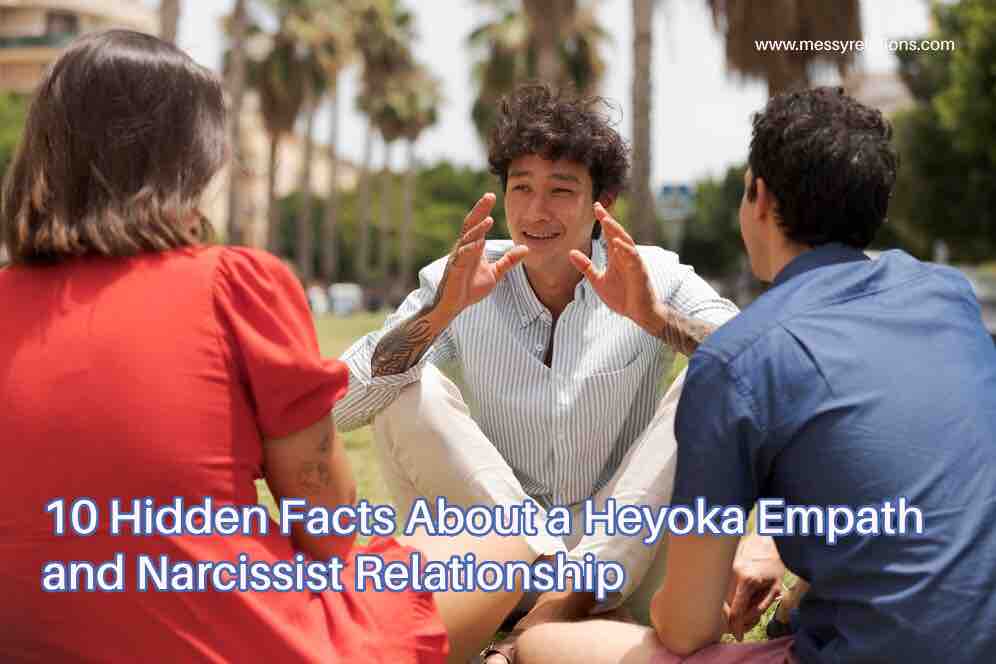Getting through the complex dynamics of a relationship where a Heyoka empath and a narcissist are involved can be both fascinating and challenging. The interplay between these two distinct personalities brings to light some hidden aspects that are worth exploring. We will delve into the intricacies of a heyoka empath and narcissist relationship, uncovering the layers that make it a unique interaction.
But for those who don’t know much about these 2 personalities, let’s help you gain some knowledge what is Heyoka empath meaning and a Narcissist and their behaviour towards relationship.
Heyoka Empath Meaning
The concept of the Heyoka empath is as intriguing as it is profound. Rooted in Native American spiritual tradition, particularly within the Lakota culture, the term “Heyoka” refers to a sacred clown or contrarian who mirrors and inverts the behavior of others. This reflection serves a deeper purpose, offering insights and promoting growth among their peers. Heyoka empaths embody this role in an emotional and spiritual sense, making them unique in the empath community.
At the heart of the Heyoka empath meaning is the ability to see the world through a different lens. They possess an innate capacity to understand and feel the emotions of others deeply, often more intensely than the individuals themselves. However, unlike traditional empaths who may become overwhelmed by these feelings, Heyoka empaths act as a mirror, reflecting these emotions back to their source. This mirroring is not just mimicry but a way to prompt individuals to introspect and recognize their own emotional and spiritual state.
The Heyoka empath navigates life with a sense of deep spiritual connection and purpose. They often experience life non-linearly, perceiving and responding to the world in ways that may seem unconventional or contrary to societal norms. This approach can be disarming, as it challenges individuals to question their perceptions and beliefs, leading to breakthroughs and personal growth.
Humor plays a significant role in the Heyoka empath’s toolkit. With a keen sense of irony and wit, they can highlight truths and offer insights in a manner that is both light-hearted and profound. This ability to blend humor with wisdom allows them to break down barriers and facilitate healing in a way that is accessible and relatable.
Despite their gifts, the path of a Heyoka empath is not without challenges. Their intense emotional receptivity and unconventional methods can sometimes lead to misunderstandings or feelings of isolation. However, their journey is also one of immense fulfillment, as they play a crucial role in the emotional and spiritual development of those around them.
In essence, the Heyoka empath meaning encompasses a complex interplay of empathy, reflection, humor, and spirituality. They remind us that growth often comes from looking at life from a different perspective and that true understanding and empathy can transform not just individuals but entire communities.
Narcissist and How They Handle Relationships?
Narcissism, characterized by an inflated sense of self-importance and a deep need for excessive attention and admiration, significantly impacts how individuals navigate and handle relationships. At the core of narcissistic behavior is a fragile self-esteem, vulnerable to the slightest criticism, which drives a range of behaviors in interpersonal dynamics.
In relationships, narcissists often take on a dominating role, prioritizing their needs and desires over those of their partners. They may initially charm and captivate their partners with grand gestures and promises, but this often serves to fulfill their need for admiration rather than genuine connection or affection.
Communication with a narcissist can be challenging, as they tend to see conversations as opportunities to assert dominance rather than exchange ideas or understand another’s perspective. They may use manipulation tactics, such as gaslighting, to maintain control and diminish their partner’s sense of reality and self-worth.
Narcissists struggle with empathy, finding it difficult to genuinely understand or share the feelings of their partners. This lack of empathy can lead to a dismissive or belittling attitude toward their partner’s needs and emotions, further straining the relationship.
The handling of conflict by narcissists is often characterized by defensiveness and aggression. Instead of seeking resolution or compromise, they might blame their partner for any issues, refusing to acknowledge their role in the conflict. This can lead to a cycle of unresolved disputes and escalating tensions.
In terms of commitment, narcissists may show an aversion to true intimacy and vulnerability, elements essential for a deep and meaningful relationship. Their fear of being exposed or losing control can prevent the formation of a genuine, reciprocal bond with their partner.
Despite these challenges, it’s important to recognize that not all hope is lost in relationships with narcissists. With awareness, professional help, and a willingness to change, it’s possible for individuals with narcissistic tendencies to develop healthier ways of relating to others. However, this requires a significant amount of effort and commitment to personal growth.
Understanding how narcissists handle relationships can offer valuable insights into the complexities of their interpersonal dynamics. It highlights the importance of empathy, communication, and mutual respect in building and maintaining healthy relationships, contrasting sharply with the narcissistic approach.
Now let’s help you know about the some less known facts about a Heyoka Empath and Narcissist Relationship.
Hidden Facts About a Heyoka Empath and Narcissist Relationship
Here are some facts you must know.
1. There Is A Magnetic Attraction
Initially, the heyoka empath and narcissist relationship might seem surprisingly harmonious. The Heyoka’s nurturing and understanding nature can be highly attractive to the narcissist, who seeks admiration and validation. This attraction, however, is often rooted in the narcissist’s perception of the Heyoka as a source of endless empathy and attention, rather than a genuine emotional connection.
2. The Mirror Effect Works
Heyoka empaths are known for their ability to mirror emotions, a trait that can have a profound impact on narcissists. Initially, this mirroring can draw the narcissist closer, fascinated by the Heyoka’s depth of understanding. However, over time, this reflection might become uncomfortable for the narcissist as it challenges their self-perceptions and ego.
3. There’s A Challenge of Emotional Depth
Heyoka empaths thrive on emotional depth and genuine connections, something that can be challenging for a narcissist to sustain. The Heyoka’s desire for a deep, meaningful relationship might be met with resistance from the narcissist, who may struggle with vulnerability and true emotional intimacy.
4. The Power Dynamics Can Be Complex
In a heyoka empath and narcissist relationship, power dynamics can be complex and ever-shifting. The Heyoka, with their innate ability to reflect and challenge, might inadvertently threaten the narcissist’s need for dominance and control, leading to tension and conflict.
5. They Still Have Healing Potential
Interestingly, the relationship holds a potential for healing, particularly for the narcissist. The Heyoka’s reflective nature and capacity for deep empathy can provide a space for the narcissist to confront their deeper insecurities and perhaps initiate a journey toward self-awareness and change, albeit this is a challenging path and not always successful.
6. Relationship Is An Emotional Rollercoaster
Relationships involving Heyoka empaths and narcissists can be marked by emotional highs and lows. The Heyoka’s empathic abilities can absorb the emotional turmoil of the narcissist, leading to a rollercoaster of emotional experiences that can be draining for the Heyoka.
7. There’s Struggle for Authenticity
For Heyoka empaths, authenticity in relationships is paramount. This fundamental need can clash with the narcissist’s tendency to wear masks and project an idealized self-image, creating a disconnect that can be difficult to bridge.
8. There Is A Big Learning Curve
For the Heyoka, a relationship with a narcissist can serve as a powerful learning experience. It can teach boundaries, self-care, and the importance of reciprocal emotional exchange in relationships. These lessons, although tough, are invaluable for personal growth.
9. There’s Still Risk of Burnout
The intense nature of a heyoka empath and narcissist relationship can lead to burnout, particularly for the Heyoka. Constantly being the emotional support for the narcissist without receiving the same level of empathy and understanding in return can be exhausting and unsustainable.
10. There’s Potential for Transformation
Despite the challenges, there’s a unique transformational potential within these relationships. The Heyoka’s influence can, in some cases, inspire a narcissist toward self-reflection and personal growth. However, this potential is highly dependent on the narcissist’s willingness to engage in genuine self-examination and change.
The dynamic between a Heyoka empath and a narcissist is complex and filled with both challenges and opportunities for growth. While the Heyoka brings to the relationship a deep capacity for empathy and reflection, the narcissist’s need for admiration and control can create a tumultuous environment. Navigating this relationship requires awareness, boundaries, and a strong sense of self from the Heyoka empath. For those who find themselves in such a relationship, understanding these hidden aspects can provide valuable insights and strategies for maintaining balance and emotional well-being.




